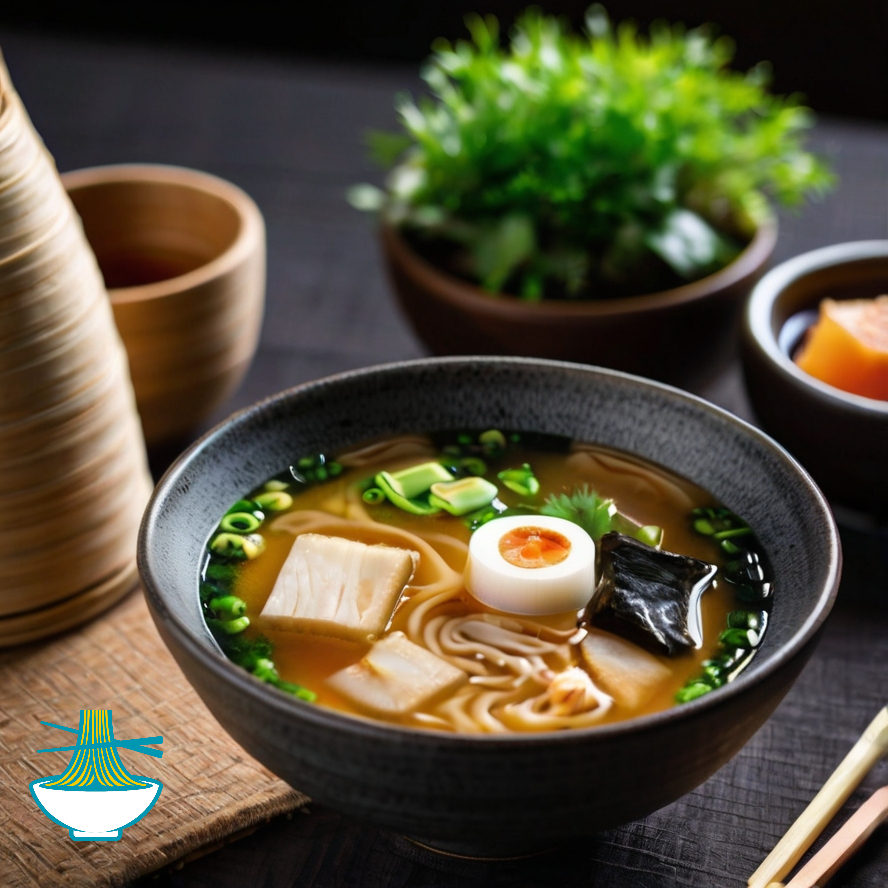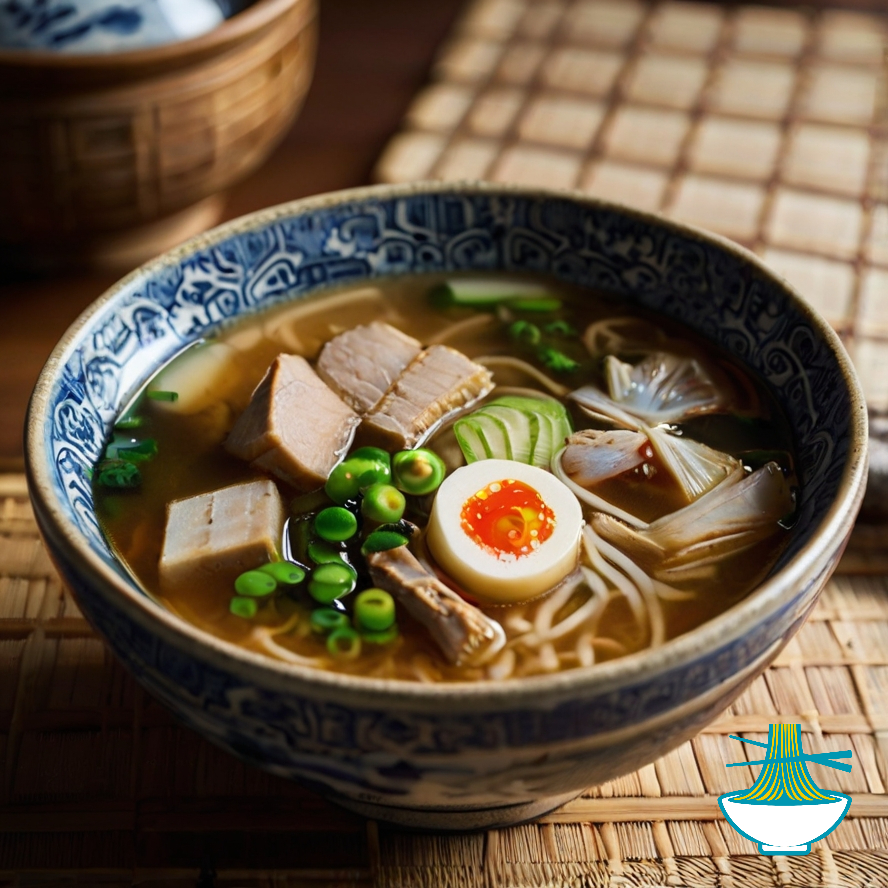Dive into the rich culinary heritage of Japan with Miso Soup, a beloved dish that embodies the essence of umami flavor. Discover the artistry behind this iconic soup, which blends fermented soybean paste, dashi broth, and an array of fresh ingredients like tofu, seaweed, and green onions. Learn about the cultural significance of Miso Soup in Japanese cuisine, its health benefits, and how it reflects the harmony of flavors and textures central to Japanese culinary philosophy. Whether you're a seasoned food enthusiast or a curious newcomer, join us on a flavorful journey through the heart of Japan's culinary traditions with Miso Soup as our guide.
Ingredients:
- 4 cups dashi broth (you can make it from scratch using kombu seaweed and bonito flakes, or use instant dashi powder)
- 3 tablespoons miso paste (white or red, depending on your preference)
- 1 block (about 200g) silken tofu, cut into small cubes
- 2 green onions, thinly sliced
- 1 sheet nori (dried seaweed), cut into small pieces (optional)
- Optional additions: sliced mushrooms (shiitake or enoki), wakame seaweed, cooked shrimp, clams, or thinly sliced vegetables like spinach or cabbage
Instructions:
1- Start by preparing the dashi broth. If you're making it from scratch, soak a piece of kombu seaweed (about 4x4 inches) in 4 cups of water for at least 30 minutes. Then, gently heat the water until it's about to boil, but do not let it boil. Remove the kombu just before the water starts boiling. If you're using bonito flakes, add them to the water after removing the kombu, bring it to a boil, then simmer for about 5 minutes. Strain the liquid to remove any solids. If you're using instant dashi powder, simply dissolve it in 4 cups of hot water according to the package instructions.
2- In a small bowl, dilute the miso paste with a few tablespoons of the warm dashi broth to make it easier to mix.
3- Bring the remaining dashi broth to a gentle simmer in a pot over medium heat. Be careful not to boil it, as boiling can destroy some of the delicate flavors.
4- Once the dashi is simmering, add the cubed tofu and any additional ingredients you're using, such as mushrooms or seaweed. Let them cook for a couple of minutes until they are heated through and tender.
5- Turn the heat down to low. Take a ladleful of the hot broth and mix it into the bowl with the diluted miso paste. This helps to prevent the miso from clumping when added to the soup.
6- Add the miso mixture back into the pot and stir gently to combine. Avoid boiling the soup once the miso has been added, as high heat can diminish its flavor.
7- Taste the soup and adjust the seasoning if needed. You can add more miso paste for a stronger flavor or dilute it with a bit more dashi if it's too salty.
8- Just before serving, add the sliced green onions and nori pieces to the soup.
9- Serve the miso soup hot in individual bowls and enjoy as a comforting and nourishing dish that's quintessentially Japanese.
Nutritional Values :
Dashi Broth:
- Calories: 10
- Protein: 0g
- Fat: 0g
- Carbohydrates: 2g
- Fiber: 0g
- Sugars: 0g
benefits:
- Provides essential minerals such as iodine, magnesium, and calcium.
- May support thyroid function due to its iodine content.
- Contains compounds from kombu seaweed and bonito flakes that have potential antioxidant and anti-inflammatory properties.
Miso Paste (3 tablespoons):
- Calories: 90
- Protein: 6g
- Fat: 3g
- Carbohydrates: 9g
- Fiber: 1g
- Sugars: 2g
benefits:
- Source of probiotics, which promote gut health and may strengthen the immune system.
- Contains beneficial enzymes that aid in digestion and nutrient absorption.
- Rich in essential amino acids, providing a complete protein source for vegetarians and vegans.
- Offers various vitamins and minerals, including B vitamins, manganese, and zinc.
Silken Tofu (200g):
- Calories: 95
- Protein: 9g
- Fat: 5g
- Carbohydrates: 3g
- Fiber: 1g
- Sugars: 1g
benefits:
- Low in calories and fat, making it suitable for weight management and heart health.
- High in protein, promoting muscle growth, repair, and satiety.
- Contains calcium, which supports bone health and muscle function.
- Provides iron and magnesium, important for blood circulation and overall health.
Green Onions (2 tablespoons sliced):
- Calories: 4
- Protein: 0g
- Fat: 0g
- Carbohydrates: 1g
- Fiber: 0g
- Sugars: 0g
benefits:
- Rich in vitamin K, which plays a role in blood clotting and bone health.
- Contains antioxidants such as quercetin and sulfur compounds that may have anti-inflammatory properties.
- May support cardiovascular health by lowering blood pressure and improving cholesterol levels.
- Adds flavor and freshness to dishes without significantly increasing calorie intake.
Nori (1 sheet, approximately 2.5g):
- Calories: 10
- Protein: 1g
- Fat: 0g
- Carbohydrates: 1g
- Fiber: 1g
- Sugars: 0g
benefits:
- Excellent source of iodine, essential for thyroid function and metabolism.
- Contains antioxidants like carotenoids and flavonoids, which help protect cells from damage.
- Rich in vitamins and minerals, including vitamin A, vitamin C, vitamin B12, and iron.
- Provides dietary fiber, supporting digestive health and promoting a feeling of fullness.
Please note that these values are approximate and can vary based on specific brands and preparation methods. Additionally, the nutritional values may change if you add any optional ingredients such as mushrooms, seaweed, or additional vegetables.


Comments